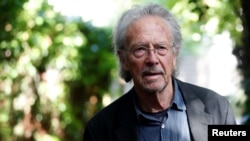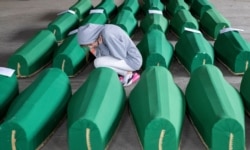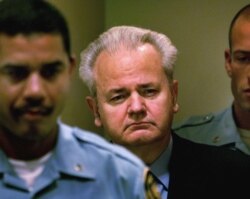VOA's Dzeilana Pecanin and Ivana Konstantinovic contributed to this report.
Almost immediately after Polish author Olga Tokarczuk and Austria’s Peter Handke were awarded the Nobel Literature Prize, reactions started to pour in, lamenting Handke’s positions about war crimes in the Balkans.
Handke won the 2019 prize for “an influential work that with linguistic ingenuity has explored the periphery and the specificity of human experience” while Tokarczuk won the 2018 prize “for a narrative imagination that with encyclopedic passion represents the crossing of boundaries as a form of life.”
Praise from academy
In its motivation for Handke, the Swedish Academy says that with his debut novel “Die Hornissen” published in 1966 and the play “Publikumsbeschimpfung” (“Offending the Audience,” 1969), Handke set his mark on the literary scene.
“More than 50 years later, having produced a great number of works in different genres, 2019 Literature Laureate Peter Handke has established himself as one of the most influential writers in Europe after the Second World War,” the Academy said.
The body praised his drama, “Walk About the Villages,” and the novel, “Repetition,” saying that his writing “shows and unending quest for existential meaning.”
The Academy also singled out “A Sorrow Beyond Dreams,” in which he wrote about his mother’s suicide, calling it “short and harsh, but deeply affectionate book.”
Handke told reporters outside his home near Paris that he never thought they would choose him.
“It was very courageous by the Swedish Academy, this kind of decision,” he added. “These are good people.” The Swedish Academy is the body that chooses the winners for the Nobel Prize in Literature.
Defense of Serbian nationalists
The 76-year-old author has been criticized for his defense of Serbian nationalists during the 1990s wars in the Balkans. He has denied that genocide took place in the Bosnian village of Srebrenica, where about 8,000 Muslims were massacred by Serb soldiers in 1995, despite a U.N. ruling to the contrary. He attended and spoke at the 2006 funeral of former Serbian leader Slobodan Milosevic, who at the time was facing war crimes charges, calling him “a rather tragic man.”
Handke decried the 1999 NATO bombing against Serbian forces to stop ethnic cleansing in the Balkans and suggested Bosnian people massacred themselves.
Vlora Çitaku, Kosovo’s ambassador to the United States, commented on Twitter and later told VOA’s Albanian Service the decision to award the Nobel for literature to a genocide denier and Milosevic apologist “is a slap in the face of all the victims of the wars in Kosovo and Bosnia.”
“Have we become so numb to racism, so emotionally desensitized to violence, so comfortable with appeasement that we can overlook one’s subscription and service to the twisted agenda of a genocide?” Çitaku told VOA Thursday.
She urged the Swedish Academy to revoke this decision. So did the Academy of Sciences and Arts of Kosovo.
“We never thought we would witness so soon the amnesia and moral amnesty of those who passionately supported a killer of peoples, like your laureate Peter Handke,” the body said in a letter to the Swedish Academy.
Salman Rushdie, author of the “Satanic Verses” and most recently “Quichotte,” once criticized Handke for “a series of impassioned apologies for the genocidal regime of Slobodan Milosevic.”
On Thursday, he tweeted several responses about the award, including replying to a post by Çitaku, saying he wrote “about Handke’s idiocies 20 years ago.”
Albanian Prime Minister Edi Rama also tweeted, calling the choice to award the Nobel to Handke “disgraceful.”
Zlatko Dizdarevic, a prominent Bosnian journalist and writer, told VOA’s Bosnian Service he was not surprised by the award.
“Nobel prize (for literature) for a long time now has not been, by itself, the proof of the high quality or greatness of someone’s work,” he said.
‘One jerk’
Another well-known Bosnian writer, Ferida Durakovic, commented on Facebook: “Nobel’s literature prize won (by) one magnificent Olga Tokarczuk and one jerk from Austria, a fan of the works of (former Serbian dictator) Slobodan Milosevic. Those who remember Balkan wars 1992-1995, remember Handke’s dishonorable liking of Milosevic’s regime in Serbia.”
Handke’s mother was Slovenian and he was raised near Austria’s border with what was then Yugoslavia, of which Slovenia used to be a part of. He has said the interest in the Balkans is rooted in his family’s history.
Florian Bieber, a Balkans analyst at Austria’s University of Graz, told VOA’s Serbian Service the problem is not even whether a good writer can be penalized for his views outside of literature, because, in this case, his views are reflected in his work.
“This makes this award very problematic because it’s not just his political statements, but he’s also written about that. He has published, as I mentioned, three books, two of them travelogues and a theater play which reflect this view.”
“I am a writer and not a judge,” Handke told The New York Times in 2006 after attending Milosevic’s funeral.
“I’m a lover of Yugoslavia — not so much Serbia, but Yugoslavia — and I wanted to accompany the fall of my favorite country in Europe, and this is one of the reasons to be at the funeral.”
But Bieber said Handke supports not Serbian values but nationalistic Serbian values.
Challenged author’s views
Bieber recalled being present at a discussion about Handke’s book, “A Journey to the Rivers: Justice for Serbia,” in 1996, where, when challenged about his views, the author used expletives.
Serbia applauded the decision of the Academy to pick Handke, with Serbia’s Culture Minister Vladan Vukosavljevic saying he should have received the Nobel Prize a long time ago, suggesting he didn’t get it because he supported Serbs during the Balkans 1990s conflicts that broke up Yugoslavia.
The writer himself told Serbian TV he was happy to be honored and speaking in Serbian, added, “Tonight we’ll have a rakija (Serbian brandy) and a glass of white wine.”
The Swedish Academy had not responded to a request for comment by VOA.
The controversy comes one year after the academy did not name a winner for the literature prize following accusations of sexual abuse and other wrongdoing by people connected to the academy.






